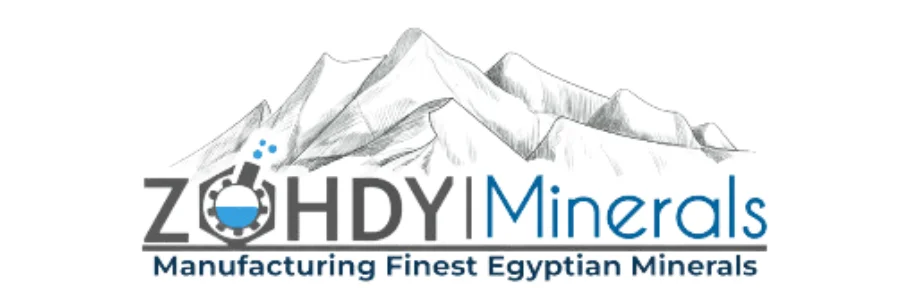Uncoated Calcium Carbonate in the Rubber and Tire Industry in Saudi Arabia, The rubber and tire industry is one of the most vital sectors in modern industrial development. Tires are indispensable for transportation, while rubber products such as conveyor belts, hoses, gaskets, footwear, and molded parts are essential components in construction, automotive, consumer goods, and other industries.
Uncoated Calcium Carbonate in the Rubber and Tire Industry
With the increasing need for cost-efficiency, high durability, and optimal performance, manufacturers are constantly seeking to improve rubber formulations to meet market demands and regulatory requirements. The selection of filler materials is a key factor affecting rubber compounds; these materials act not only as fillers but also as functional additives that directly influence the physical, mechanical, and economic properties of the formulation.
Among these materials, Uncoated Calcium Carbonate (UCC) has emerged as a widely used option in the rubber and tire industry in Saudi Arabia, thanks to its balance of price, performance, and availability.
What is Uncoated Calcium Carbonate (UCC) in the Saudi Rubber and Tire Industry?
Calcium Carbonate (CaCO3) is a naturally occurring mineral typically derived from high-purity limestone deposits through crushing, grinding, and fine screening. It is then processed into a powder with controlled particle sizes. If it is not treated with coating materials such as stearic acid, it is termed “uncoated.”
Uncoated Calcium Carbonate (UCC) in the Saudi rubber and tire industry retains its natural hydrophilic (water-loving) surface, making it suitable for applications requiring compatibility with polar components or where cost reduction is prioritized over the additional properties offered by coated types of calcium carbonate. Zohdy Minerals Egypt provides the finest grades of Uncoated Calcium Carbonate (UCC) available in the markets for the rubber and tire industry in Saudi Arabia.
Comparison: Uncoated vs. Coated Calcium Carbonate
| Feature | Coated Calcium Carbonate | Uncoated Calcium Carbonate (UCC) |
| Surface | Surface properties are modified to enhance dispersion and bonding in hydrophobic polymers. | Untreated; maintains its natural surface properties. |
| Cost | Higher material cost. | More economical; a cost-effective alternative. |
| Application | Used in high-performance applications. | Widely used in rubber compounds where compatibility issues are not a major obstacle. |
| Industry Preference | Used in specific high-end applications. | Often chosen in the tire and rubber industry to achieve a balance between cost and function. |
Key Characteristics of Uncoated Calcium Carbonate in the Saudi Rubber and Tire Industry
- Particle Size Distribution: UCC can be ground into ultrafine or larger powders as needed. Smaller particles provide better reinforcement and surface smoothness, while larger particles offer greater dimensional stability.
- Purity and Brightness: High-purity grades of UCC in the Saudi rubber and tire industry, containing more than 95% CaCO3, minimize impurities like iron, silica, and magnesium. High brightness levels are crucial for light-colored rubber products. Zohdy Minerals Egypt offers the highest purity and brightness UCC grades for the rubber and tire industry in Saudi Arabia.
- Mechanical Reinforcement: Although less reinforcing than carbon black or precipitated silica, UCC in the Saudi rubber and tire industry provides acceptable stiffness and dimensional stability to the rubber.
- Processing and Flow: The use of UCC in the Saudi rubber and tire industry improves mixing efficiency and flowability and reduces shrinkage during curing, which facilitates manufacturing processes.
- Thermal and Chemical Stability: UCC in the Saudi rubber and tire industry remains stable at common curing temperatures, ensuring the long-term durability of the final product.
Benefits of Using Uncoated Calcium Carbonate (UCC)
- Cost Reduction: UCC in the Saudi rubber and tire industry reduces the need for large quantities of expensive polymers and reinforcing materials.
- Improved Dimensional Stability: UCC minimizes shrinkage and distortion, which is essential for parts like gaskets and hoses.
- Ease of Operation: UCC in the Saudi rubber and tire industry increases mixing efficiency and reduces energy consumption.
- Balanced Mechanical Properties: UCC provides acceptable stiffness, tensile strength, and elongation.
- Aesthetic Quality: The high brightness grades of UCC in the Saudi rubber and tire industry ensure color consistency.
- Sustainability: As UCC is derived from natural limestone, it is an environmentally friendly option compared to other synthetic alternatives.
Applications of Uncoated Calcium Carbonate (UCC)
- Tires: UCC is used in inner liners, sidewalls, and secondary components where cost reduction is the priority.
- Industrial Rubber Products: Such as belts, hoses, gaskets, and seals.
- Footwear and Consumer Goods: Such as shoe soles and molded rubber parts.
- General Rubber Compounds: UCC is used as a semi-reinforcing filler and a processing aid.
Read more: uncoated calcium carbonate uses
Challenges Associated with UCC Use
- Dispersion Issues: In hydrophobic polymers, dispersion may be less efficient compared to coated alternatives.
- Lower Reinforcement: Compared to carbon black and silica.
- Compatibility: The hydrophilic surface of UCC in the Saudi rubber and tire industry may limit its use in some formulations.
- Need for Process Adjustment: Achieving optimal performance requires selecting appropriate grades and controlling mixing conditions.
Future Opportunities for Uncoated Calcium Carbonate (UCC)
- Nanogrades: Advances in grinding technology will allow the production of nanoscale calcium carbonate to enhance performance.
- Hybrid Filler Systems: Combining calcium carbonate with carbon black or silica to achieve an optimal balance of properties.
- Innovation in Green Tires: UCC plays a role in the development of low-rolling resistance and environmentally friendly tires.
- Local Manufacturing: Supporting supply chains by providing local sources reduces cost and emissions. Zohdy Minerals Egypt is actively working to provide supply chains and support at all levels.
Uncoated Calcium Carbonate (UCC) in the Saudi rubber and tire industry is one of the most versatile and cost-effective fillers in the industry. It offers a good balance between economics, ease of processing, and acceptable mechanical properties, making it an essential component in many rubber formulations. Choosing a reliable supplier like Zohdy Minerals Egypt is as crucial as selecting the right product raw material.






